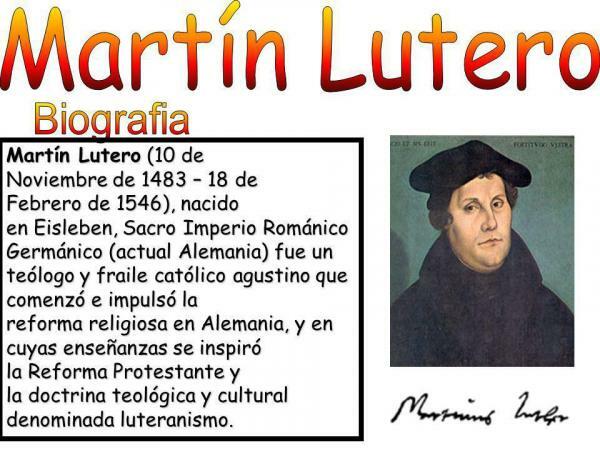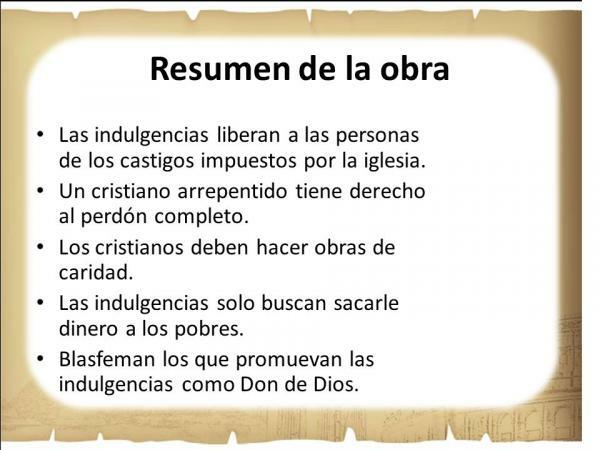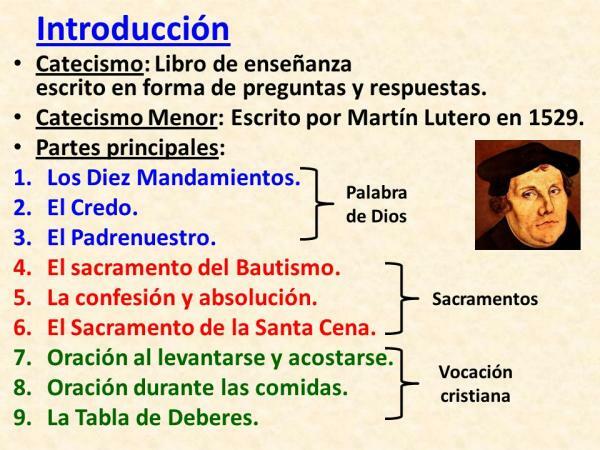Martín LUTERO: most important works

Image: Slideshare
Sometimes, certain people can change the world with their works, the writings of these authors being vital to understanding the world centuries later. If we talk about religious authors, one of the most relevant is Luther, whose work was able to change western thinking and create new religions in states such as the British or the German. To talk about the figure of him in this lesson from a TEACHER we are going to talk about the most important works of Martin Luther.
Index
- Who was Martin Luther?
- The Ninety-Five Theses: Luther's Most Important Work
- Other works by Martin Luther
Who was Martin Luther?
Martin Luther was a German Catholic theologian that began the great religious reform in Germany. Luther was a priest and professor of theology at the University of Wittenberg, already then quite critical of the situation of religion at that time, teachings that he transmitted to his pupils.
Luther considered that the Church had turned its back on the Bible and were his texts on this situation,
criticizing the figure of the papacy and of the high corrupt spheres of the Vatican, which made many European churches change, initiating the call Protestant Reformation.Luther was excommunicated by the Pope, he was exiled and the performance of his works was prohibited. Still, the movement created by Luther could not be stopped and the position of the new reformist churches changed the western landscape forever, creating two different Europes.
But the influence of Luther not only affected the creation of the Protestant Reformation, but his movement made necessary the Counter Reformation, being a series of changes in the Catholic Church to modify the thought of him due to the rise of the Protestant religion. It could be said that the work of Luther brought the change of all the relevant religions of Europe.

Image: Master Publi
The Ninety-Five Theses: Luther's Most Important Work.
If we talk about the most important works of Luther, the one that we have to explain more exhaustively is that of The ninety-five theses, being the one started the whole reform process and, therefore, the most relevant.
In his time as a teacher he wrote a series of texts on the sale of indulgences by the Church, being a kind of divine pardons that the Church sold people with wealth. These theses were intended for debate, being put at first at one of the doors of his university, without the aim of reaching much further. But the works had a great impact, so Luther sent them to the Archbishop of Mainz, and he placed them throughout the city. Soon the work had been copied and sent throughout the Holy German Empire and throughout much of Europe.
The play talks about Luther's thought that repentance to heal sins must be born of the individual's faith and not of an act like the sacrament of confession. According to Luther, the sacrament of confession and indulgences, being payments to the Church to cleanse the soul, were an evil that should be eradicated, since its existence prevented Christians from actually cleansing their sins through the repentance.
The last part of the text is one of the most relevant, since in it Luther talks about questions that his followers had asked him, about indulgences and he wondered if the Pope could cleanse any sin according to indulgences, why he did not cleanse the souls of all Christians, regardless of the money that had.

Image: Slideplayer
Other works by Martin Luther.
To continue with this lesson the most important works of Martin Luther, we must talk about all those of great relevance written by Luther and that are not The ninety-five theses.
Small catechism of Luther
It is a catechism written by Luther in 1529 that is part of the main works of Lutheranism, and whose function is that of serve for the religious instruction of minors. In this work, Luther collects the Ten Commandments, the Apostolic Creed, the Our Father and the sacraments of Baptism and the Eucharist.
This text has survived to this day, using it basically to educate the youngest in the way of religion, and serving therefore for anyone who wants to enter Lutheranism for the first time, consisting of the basic ideals of Luther.
Greater Catechism of Luther
Another catechism written by Luther in 1529 and consisting of numerous writings by Luther on the sacred texts that make up the Bible. This text works for clergymen and it serves so that they can carry out their acts in front of their faithful.
The books that make up the Greater Catechism of Luther are the Ten Commandments, the Apostolic Creed, the Our Father and the sacraments of baptism and communion. Contrary to the Small Catechism, in this work we can find a greater reflection on biblical texts, possessing greater complexity.
Smalkalde Articles
It's a summary of Luther's doctrine written in 1527 and whose function was to present it to the Schmalkalden League, this being a group of Protestant princes of the Holy Germanic Empire. Currently these texts are part of the set of books that are part of the Lutheran doctrine, although at that time their function was to only be a writing so that the Protestant princes would have the capacity to face the Catholic monarchs by his faith.
Doctrine of the two kingdoms
Is a work based on a sermon by Luther in which they talk about two forms of government of God. It is said that God governs earthly life through religious law, this being his left hand, while the divine world is ruled by his right hand, that is, with the gospel and grace divine.

If you want to read more articles similar to Martin Luther: most important works, we recommend that you enter our category of Story.



